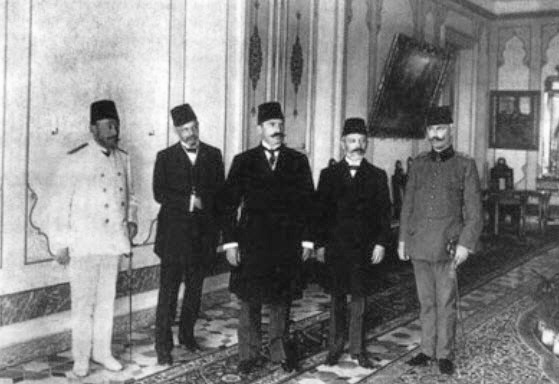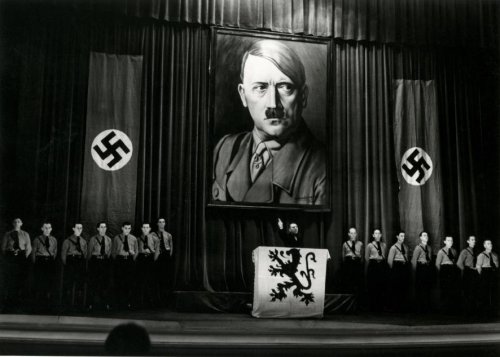|
Ibrahim Biçakçiu
Ibrahim Aqif Biçakçiu (also known as Ibrahim Biçaku) (10 September 1905 – 4 January 1977) was an Albanian landowner and Axis collaborator, Chairman of the Provisional Executive Committee from 14 September to 24 October 1943, and Prime Minister of Albania from 6 September to 26 October 1944 during the Nazi occupation. Biography Early life Born in 1905, Elbasan which was located in the Manastir vilayet of the Ottoman Empire, today modern day central Albania. Ibrahim Biçakçiu was the son of Aqif Pasha Biçakçiu of Elbasan and the grandson of Mustafa Pasha Biçakçiu, patriarch of one of the three landowning influential and respected Albanian families of the town. His grandmother Shefikat Hanëm Alizoti was from the Alizoti family, which made him the he cousin of Esad Pasha Toptani and his family. His mother was Ifete Hanëm Vrioni of the Vrioni family. His surname, derived from Turkish ''bıçakçı'', means "knifesmith" suggesting that was his ancestors craft/ pro ... [...More Info...] [...Related Items...] OR: [Wikipedia] [Google] [Baidu] |
List Of Heads Of State Of Albania
This is a list of Head of state, heads of state of Albania who have served since the Albanian Declaration of Independence, Declaration of Independence of 1912. Since the Fall of communism in Albania, collapse of the communist regime in 1991, the head of state of Albania is the President of Albania, president of the republic (). The president is Indirect election, indirectly elected to a five-year term and is limited to a maximum of two terms, as specified by the Constitution of Albania, Constitution. As in most parliamentary systems, the president is now by-and-large a Figurehead, ceremonial office, with the Prime Minister of Albania, prime minister ''de facto'' heading the Executive (government), executive branch. Heads of state Independent Albania (1912–1914) Republic of Central Albania (1913–1914) Principality of Albania (1914–1925) Albanian Republic (1925–1928) Albanian Kingdom (1928–1939) Italian Albania (1939–1943) German ... [...More Info...] [...Related Items...] OR: [Wikipedia] [Google] [Baidu] |
Aqif Pasha Biçakçiu
Aqif Pasha Biçaku mostly known as Aqif Pashë Elbasani (1860 – 10 February 1926) was an Ottoman Albanian political figure in the Sanjak of Elbasan and after the Young Turk Revolution became an activist for the Albanian national cause. Life Aqif Pasha was born in 1860, Elbasan, back then Vilayet of Monastir, Ottoman Empire, today central Albania, son of Mahmud Pertef Pasha Biçakçiu, patriarch of one of the three landowning influential and respected families of the town and his mother Shefikat Hanëm Alizoti from the Alizoti family, whose sister was Vafsije Alizoti the mother of Essad pasha Toptani and Gani Toptani which made him the maternal first cousin of Esad Pasha Toptani and Gani Toptani. His surname, derived from Turkish ''bıçakçı'', means "knifesmith" suggesting that was his ancestors' craft/profession (cognate with the Bosniak surname Bičakčić). In his first school years he was taught privately and afterwards he was educated in Istanbul. He was an activist ... [...More Info...] [...Related Items...] OR: [Wikipedia] [Google] [Baidu] |
Albanian Declaration Of Independence
The Albanian Declaration of Independence (Albanian language, Albanian: ''Deklarata e Pavarësisë'') was the declaration of independence of Albania from the Ottoman Empire. Independent Albania was proclaimed in Vlorë on 28 November 1912. Six days later the Assembly of Vlorë formed the first Government of Albania which was led by Ismail Qemali and the Council of Elders (Pleqnia). The success of the Albanian revolt of 1912, Albanian Revolt of 1912 sent a strong signal to the neighboring countries that the Ottoman Empire was weak. The Kingdom of Serbia opposed the plan for an Albanian Vilayet, preferring a partition of the European territory of the Ottoman Empire among the four Balkan League, Balkan allies. Balkan allies planned the partition of the European territory of the Ottoman Empire among them and in the meantime the territory conquered during First Balkan War was agreed to have status of the Condominium (international law), Condominium. That was the reason for Qemali to or ... [...More Info...] [...Related Items...] OR: [Wikipedia] [Google] [Baidu] |
Bičakčić
Bičakčić ( is a family surname, commonly found in Bosnia and Herzegovina. It is derived from the Turkish word ''bıçakçı'', meaning "cutler" or "knife-maker". It may refer to: *Ermin Bičakčić Ermin Bičakčić (; born 24 January 1990) is a Bosnian professional Association football, footballer who plays as a Defender (association football)#Centre-back, centre-back for 2. Bundesliga club Eintracht Braunschweig and the Bosnia and Herzeg ... (born 1990), Bosnian footballer * Edhem Bičakčić (1884–1941), mayor of Sarajevo (1928–29; 1935–39) {{DEFAULTSORT:Bicakcic Surnames of Bosnian origin ... [...More Info...] [...Related Items...] OR: [Wikipedia] [Google] [Baidu] |
Bosniak
The Bosniaks (, Cyrillic script, Cyrillic: Бошњаци, ; , ) are a South Slavs, South Slavic ethnic group native to the Southeast European historical region of Bosnia (region), Bosnia, today part of Bosnia and Herzegovina, and who share a common Genetic studies on Bosniaks, ancestry, Culture of Bosnia and Herzegovina, culture, History of Bosnia and Herzegovina, history and the Bosnian language. Traditionally and predominantly adhering to Sunni Islam, they constitute native communities in what is today Bosnia and Herzegovina, Serbia, Montenegro, Croatia and the Republic of Kosovo. Largely due to displacement stemming from the Bosnian War in the 1990s they also make up a significant diaspora with several communities across Europe, the Americas and Oceania. Bosniaks are typically characterized by their historic ties to the Bosnia (region), Bosnian historical region, adherence to Islam in Bosnia and Herzegovina, Islam since the 15th and 16th centuries, Culture of Bosnia an ... [...More Info...] [...Related Items...] OR: [Wikipedia] [Google] [Baidu] |
Turkish Language
Turkish ( , , also known as 'Turkish of Turkey') is the most widely spoken of the Turkic languages, a member of Oghuz languages, Oghuz branch with around 90 million speakers. It is the national language of Turkey and one of two official languages of Cyprus. Significant smaller groups of Turkish speakers also exist in Germany, Austria, Bulgaria, North Macedonia, Greece, other parts of Europe, the South Caucasus, and some parts of Central Asia, Iraqi Turkmen, Iraq, and Syrian Turkmen, Syria. Turkish is the List of languages by total number of speakers, 18th-most spoken language in the world. To the west, the influence of Ottoman Turkish language, Ottoman Turkish—the variety of the Turkish language that was used as the administrative and literary language of the Ottoman Empire—spread as the Ottoman Empire expanded. In 1928, as one of Atatürk's reforms in the early years of the Republic of Turkey, the Persian alphabet, Perso-Arabic script-based Ottoman Turkish alphabet was repl ... [...More Info...] [...Related Items...] OR: [Wikipedia] [Google] [Baidu] |
Vrioni Family
The Vrioni (Ottoman Turkish language, Ottoman Turkish: ''Viryon Zâdeler'') were an Albanian nobility, aristocratic Albanian family and one of the largest landowners of Albania, otherwise known as "Konaqe" or "Oxhaqe", among which the most important are: Vrioni of Berat and Fier, Vloraj of Vlora, Toptani of Tirana, Biçakçinjtë of Elbasan, Dino of Ioannina and Preveza, Vërlaci of Elbasan, Bushatllinjtë of Shkodra, Këlcyrajt of Këlcyra, Markagjonët of Mirdita, etc. Insignia titles held by members of these families, usually Pasha or Bey, corresponded to the assigned positions in the Ottoman Empire, Ottoman administration, central or local, which are given by ferman or berat (decrees) by the Sultan of the Ottoman Empire. History An aristocratic Albanian family, the Vrioni, gained several high governmental positions with the influence of the Ottoman Empire, Ottomans a part of the Vrioni family turned Islam, Muslims. In his ''Journey through Greece'',''Voyage de la Grèce'', FCHL ... [...More Info...] [...Related Items...] OR: [Wikipedia] [Google] [Baidu] |
Esad Pasha Toptani
Essad Toptani (1863/1875 – 13 June 1920) was an Albanian politician who served as the third prime minister of Albania from 1914 to 1916. He previously established the Republic of Central Albania based in Durrës. An Ottoman army officer, he served as the Albanian deputy in the Ottoman Parliament and later cooperated with the Balkan League after the Balkan Wars. Biography Early life  Essad Toptani was born in 1863 in ,
Essad Toptani was born in 1863 in ,
|
Central Albania
Central Albania () is a subdivision of Albania as defined by the Nomenclature of Territorial Units for Statistics (NUTS). It is one of the three classified NUTS-2 statistical regions of Albania. The region incorporates the central parts of the country including the capital Tirana, and encompasses an area of . It incorporates the counties of Tirana, and Elbasan. With a population of nearly one million, it is the most populated of the all the regions in Albania. Classification The country of Albania is organized into 12 counties for administrative purposes. The Nomenclature of Territorial Units for Statistics (NUTS) organizes the country into three broader level sub-divisions. These are classified as a NUTS-2 statistical regions of Albania, and incorporate one or more counties within it. The regions form the NUTS-3 territorial units under them. Geography Central Albania incorporates the central parts of the country around the capital city of Tirana, encompassing an area o ... [...More Info...] [...Related Items...] OR: [Wikipedia] [Google] [Baidu] |
Manastir Vilayet
The Vilayet of Manastir () was a first-level administrative division (vilayet) of the Ottoman Empire, created in 1874, dissolved in 1877 and re-established in 1879. The vilayet was occupied during the First Balkan War in 1912 and divided between the Kingdom of Greece and the Kingdom of Serbia, with some parts later becoming part of the newly established Principality of Albania. Administrative divisions Initially the Manastir Vilayet had the following sanjaks: * Sanjak of Manastir * Sanjak of Prizren * Sanjak of Dibra * Sanjak of Scutari After administrative reforms in 1867 and 1877 some parts of the Manastir Vilayet were ceded to newly established Scutari Vilayet (1867) and Kosovo Vilayet (1877). Administrative divisions of Manastir Vilayet until 1912: * Sanjak of Manastir: Kazas of Manastir ( Bitola), Pirlepe ( Prilep), Florina, Kıraçova ( Kičevo) and Ohrid. * Sanjak of Serfiğe (Between 1864-1867 and 1873–1892): Kazas of Serfiçe (modern Servia), Kozana (mod ... [...More Info...] [...Related Items...] OR: [Wikipedia] [Google] [Baidu] |
Albania Under Nazi Germany
Albania was occupied by Nazi Germany between 1943 and 1944 during World War II. Before the armistice between Italy and the Allied armed forces on 8 September 1943, Albania had been in a ''de jure'' personal union with and was de facto under the control of the Kingdom of Italy. After the armistice and the Italian exit from the Axis, German military forces entered Albania and it came under German occupation, creating the client-state, the Albanian Kingdom (Albanian: ''Mbretëria Shqiptare''; German: ''Königreich Albanien''). The Germans favoured the nationalist Balli Kombëtar over King Zog's Legalists and the occupation was marked by collaboration between them and the Germans. Albania under German occupation retained control of the areas it had received during Italian rule, including most of Kosovo, as well as Western Macedonia, the town of Tutin in Serbia and a strip of Eastern Montenegro. It was the policy of the Balli Kombëtar to have all Albanian populated territories ... [...More Info...] [...Related Items...] OR: [Wikipedia] [Google] [Baidu] |
Collaboration With Nazi Germany And Fascist Italy
In World War II, many governments, organizations and individuals Collaborationism, collaborated with the Axis powers, "out of conviction, desperation, or under coercion". Nationalists sometimes welcomed German or Italian troops they believed would liberate their countries from colonization. The Danish, Belgian and Vichy French governments attempted to appease and bargain with the invaders in hopes of mitigating harm to their citizens and economies. Some countries' leaders such as Henrik Werth of Axis member Hungary, cooperated with Italy and Germany because they wanted to regain territories lost during and after World War I, or which their nationalist citizens simply coveted. Others such as France already had their own burgeoning fascist movements and/or antisemitic sentiment, which the invaders validated and empowered. Individuals such as Hendrik Seyffardt in the Netherlands and Theodoros Pangalos in Greece saw collaboration as a path to personal power in the politics of their ... [...More Info...] [...Related Items...] OR: [Wikipedia] [Google] [Baidu] |




